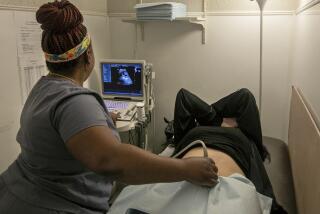Science / Medicine : Safer Test Developed for Genetic Defects in Fetus
- Share via
A safer, easier technique--involving only a tablespoon-size sample of a mother’s blood taken as early as eight weeks into a pregnancy--is being developed to test for hidden genetic disorders in a fetus.
At present, if women are troubled by the idea of possibly carrying a genetically damaged fetus, there are only two ways to settle the question: amniocentesis and chorionic villus sampling. Both require withdrawal of fluid or tissue from areas close to the developing fetus, thereby placing the fetus at risk. CVS has a 4% incidence of complications and amniocentesis 0.5%. The new technique involves no risk to the fetus.
The process, devised by Dr. Diana W. Bianchi of Children’s Hospital in Boston, involves the analysis of fetal red blood cells that “leak” from the placenta into the mother’s bloodstream. The cells are separated from the mother’s red blood cells on the basis of size and weight, then analyzed with specialized antibodies.
The technique, which could become available within a few years, can test for genetic disorders for which specific defective genes have been identified--cystic fibrosis, sickle cell anemia, thalassemia, phenylketonuria, Duchenne’s muscular dystrophy--and possibly even screen for Down’s syndrome and other chromosomal disorders.






